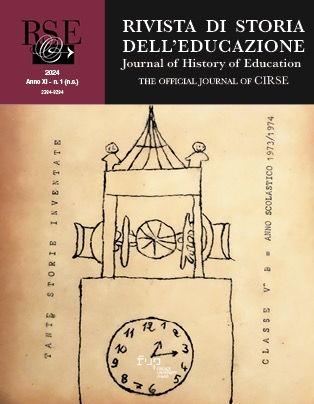Vol 11, No 1 (2024): Participation, collegiality and decentralization: a reflection on the 1970s of the Italian school, half a century after the Delegated Decrees
Issue Description
In 1974, the so-called “Decreti Delegati” occurred after years of ministerial documents and experimentations whose success depended on headmasters’ and teachers’ leanings; they put into action parts of suggestions and predictions made during the first years of 1970s. Indeed, they modified the way scholastic organisation runs, they de-verticalized it to some extent and established connections among school, society and territory on an institutional basis. This constitutes a topic that has been highly debated in the domain of educational sciences, as are the frantic and complex social events occurred after 1968.
Fifty years following its approval, contextualizing Decreti Delegati has to be strictly linked to a historical period which we need to understand, i.e., the Seventies. During the last decades, essays about the topic have multiplied: the Seventies caught the interest of historical and educational-historical research as they reveal themselves as a period marked by specific and partially transitional features. The motive lies not only in the legacy of reforms, either realized or not; but also in the expectations, in the social practices and in the new collective relations which marked that decade on a socio-cultural basis as well as on a scholastic one. The crisis of familiar and institutional structures rooted in the Italian context, in addition to the development of new manners of conceiving the relationship between individual and society, have marked the scholastic institution as well as the way education has been daily perceived in the context of formal, un-formal and non-formal education. The reforms realized, such as the integration of disabled students or “150 hours” of workers or full-time education, and the ones merely planned, namely the “scuola superiore” reform, have been both conditioned by a tough context, where new ideas and new methods of thinking, working, studying and spending time together spread themselves around classrooms.

